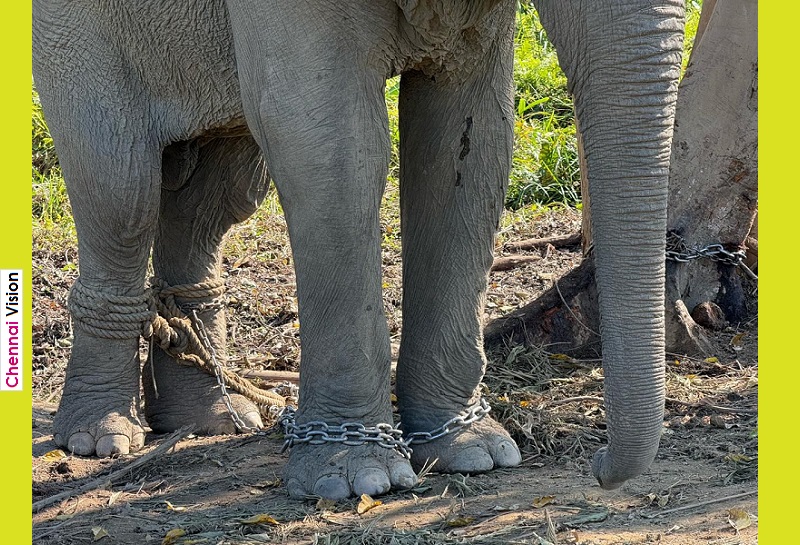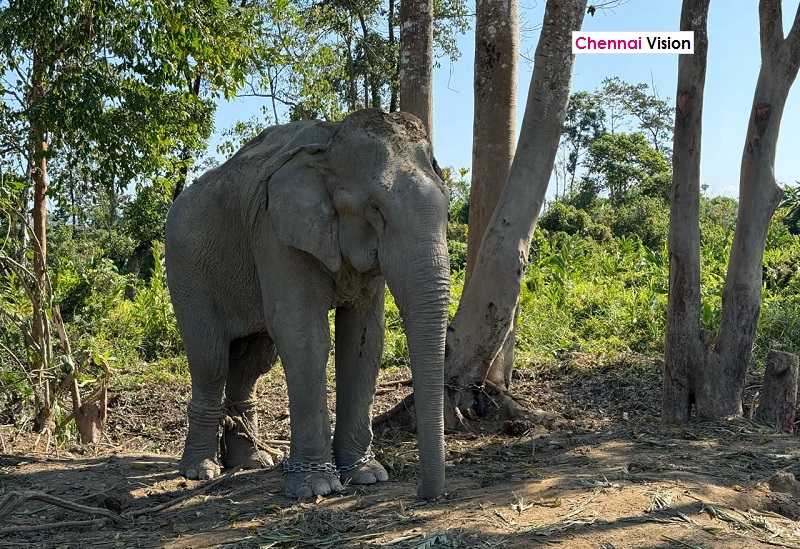Vantara to Offer Chain-Free Haven for 20 Elephants Rescued from Exploitative Logging Industry
Former Owners and Mahouts to Embrace New Livelihoods through Employment Opportunities at Vantara
Vantara, a renowned rescue center for captive elephants and other wild animals, founded by the visionary philanthropist Anant Ambani, is preparing to welcome 20 rescued elephants—10 males, 8 females, 1 sub- adult, and 1 calf—freed from the exploitative logging industry in Arunachal Pradesh. This rescue operation, carried out with the approval of the High- Powered Committee constituted by the Tripura High Court and entrusted by the Supreme Court of India, has been conducted with the full consent of the current owners of the animals. The elephants will soon find their permanent home at Vantara, an environment that naturally mirrors their native habitat, where they will live chain-free and will never be forced into labor.
The rescued elephants include individuals like Laxmi, a 10-year-old captive-born sub-adult who struggles to bear weight on her hind legs due to deep, untreated wounds and suffers from a fresh, painful 1-inch diameter hole piercing her sensitive right ear pinna—both inflicted during the brutal taming process to establish human dominance. Maya, a 2-year-old captive-born calf, was rescued alongside her mother, Rongmoti, who endured large harness-induced lesions on her chest and buttocks from prolonged logging work. Ramu, a bull elephant, was found heavily restrained with both his forelegs and hindlegs tightly tethered together to control his 4–6 month musth period, resulting in immense physical and psychological distress. Babulal, another bull elephant, suffered from a severely broken and bleeding tail, caused by a conflict with a wild bull elephant during foraging. Years of captivity had stripped him of the natural instincts needed to defend himself.
In addition to providing lifelong care for the elephants, the project offers new livelihood opportunities for the owners, mahouts, and their families at Vantara. The mahouts and others involved will undergo intensive training in humane and scientifically backed methods of elephant management, ensuring a future of compassionate care for the elephants and empowering their caregivers with the knowledge and skills to support this approach.
The organization has secured all required documentation under the Wildlife (Protection) Act, 1972, including obtaining a No Objection Certificate from the Gujarat Forest Department and a Transport Permit from the Arunachal Pradesh Forest Department. The elephants will be transported in specially designed elephant ambulances, with the calf Maya traveling alongside her mother.
A dedicated team of over 200 experts, including elephant veterinarians, paravets, senior caretakers, and ambulance drivers from Vantara, will ensure the safe and compliant transportation of the animals, adhering to strict transportation guidelines and animal welfare standards.
A research paper published in 2020 in Gajah, the biannual journal of the IUCN/SSC Asian Elephant Specialist Group, reveals that a significant number of privately owned elephants are bred in captivity in Arunachal Pradesh. These elephants are often managed in close proximity to forested areas, where captive cow elephants come into contact with wild bulls. However, private ownership of elephants is declining, as the demand for their use in forestry operations has diminished following the logging ban.
Mr. Tabang Jamoh, Divisional Forest Officer, Namsai, confirmed, “With an active breeding population of approximately 200 captive elephants in Arunachal Pradesh, DNA profiling is being conducted to closely monitor their health and welfare. The transfer of 20 elephants to the Radhe Krishna Temple Elephant Welfare Trust at Vantara, as directed by the Supreme Court-appointed committee, ensures a brighter future for these animals. This initiative enhances animal welfare while providing local communities with alternative livelihoods, striking a balance between conservation, community well-being, and forest protection.”
Dr. Sorang Tadap, Veterinary Officer at Itanagar Biological Park, stated, “Captive elephants often suffer from severe health issues, including injuries, arthritis, and psychological trauma due to harsh labor, training, and prolonged chaining. Many calves sustain deep leg injuries during training, while adults face ongoing risks from conflicts with wild bulls. There is an urgent need for dedicated hospital facilities offering round-the-clock care and physiotherapy, which our state currently lacks. It is encouraging to see facilities like Vantara providing advanced medical treatment and lifelong care for rescued elephants, setting a vital benchmark for their welfare.”
Chow Thamasala Mein, one of the elephant owners, highlighted the uniqueness of the initiative: “With wood logging banned, we no longer wish to use our elephants for such labor. We are pleased they will now live a life of care at Vantara. This initiative also provides stable jobs and a steady income for our families, securing a brighter future for our children.”
In the exploitative logging industry, elephants suffer greatly as they are forced to carry heavy logs and work tirelessly for long hours. They endure physical abuse, malnutrition, arthritis, and lack of medical care. Constantly chained, they are deprived of the freedom to roam and engage in natural behaviors. These harsh conditions also inflict severe psychological trauma, often evident in the form of stereotypic behaviors such as head bobbing, swaying, and weaving, leading to long-term welfare compromises. Despite their intelligence and social nature, these elephants are treated as machines, stripped of their dignity and well-being. At Vantara, they will have the opportunity to rejuvenate and live as elephants should.

